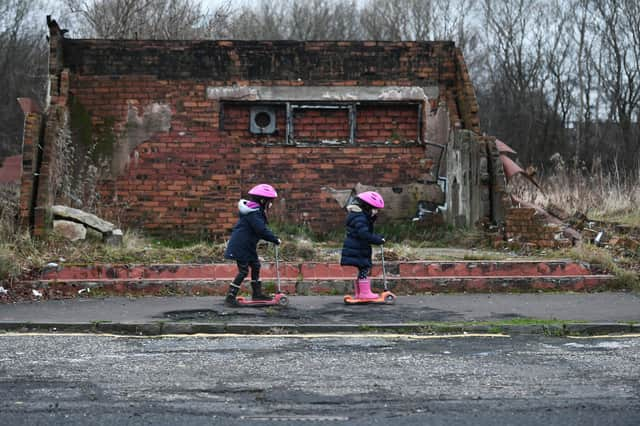Cost of living crisis is hitting Scotland much harder than rest of UK. Urgent government action is required – Mubin Haq


At Abrdn Financial Fairness Trust, we have been monitoring household finances for the past couple of years. Initially we were surprised that more people were not pushed into hardship by the pandemic, that the expected downturn was held at bay.
Of course, we’re talking in general terms here. Many of those facing hardship continued to struggle, but on the whole many families’ incomes were protected. This was primarily due to large-scale government intervention such as furlough, self-employment grants and support through payment holidays.
Advertisement
Hide AdAdvertisement
Hide AdNo one reading this will be surprised the situation has changed dramatically, with inflation creating a cost-of-living crisis not seen for decades.
Our latest survey, of around 6,000 people, found one-in-six UK households are now in "serious financial difficulties”, compared to one-in-ten in October 2021 – that’s an additional 1.6 million families pushed into severe hardship in less than a year.
Of those in serious financial difficulties, they have tried various ways to make ends meet: 71 per cent have reduced the quality of food they eat; 36 per cent have sold or pawned possessions; and 27 per cent have cancelled or not renewed insurance. This is worse than at any point during the pandemic.
On a number of measures, Scotland appears to be faring worse than England. While around 15 per cent of English households are in serious financial difficulties, in Scotland that figure is 21 per cent – that’s proportionally 40 per cent higher than England. By serious financial difficulties, we mean things like struggling to pay for essentials such as food and bills, having no savings, and/or being behind on bills.
We asked people how they were coping with the increasing cost of living. Here again, Scots were more likely to be cutting back on things like food, energy use and general overall spending. Scottish households are also less likely to have savings: 34 per cent reported having none – that’s ten percentage points higher than in England. This equates to around 850,000 households in Scotland with no savings, no safety net to fall back on.
We spoke to one single mother who is struggling to feed her children. She said: “If you open my fridge, it’s like a single person is living there rather than a family.” She has cut back on spending on toothpaste, soap and washing powder and uses minimum lighting at night.
This is a story repeated across the country, creating misery and anxiety for millions. And again, in Scotland people are more worried about their finances: 30 per cent versus 23 per cent in the UK. In total, over 1.5 million households in Scotland report feeling quite or very worried about their finances.
The support package announced by the UK Government back in spring was welcome, providing targeted support for those on social security, disabled people and pensioners, as well as wider support for energy bills and council tax rebates. The recent energy price guarantee has also brought much needed relief – it avoided the roof falling in on household finances.
Advertisement
Hide AdAdvertisement
Hide AdHowever, big gaps remain and there are serious questions as to who will ultimately pay for the guarantee – one of the most expensive fiscal policy decisions made in decades.
Over recent months, it has become increasingly apparent that more support is urgently needed, especially for those on the margins. This is what many of us were hoping for in last Friday’s mini-Budget.
There were some big winners from the Chancellor’s tax cuts, but the gains were not targeted at those who needed them most. Far from it – nearly half of the windfall went to the top five per cent of earners.
That staggering statistic leaves millions in a desperate situation. However, these changes don’t necessarily transfer automatically to Scotland and recent statements from Nicola Sturgeon and John Swinney indicate the abolition of the top rate of tax is highly unlikely. This does mean that the Scottish Government will have some additional funds to play with, about £600 million, which it could target at those most in need.
So, what can Scotland do? Some important commitments have already been made, in particular the increase in the Scottish child payment from £20 to £25 per week. The Scottish Government has also announced a rent freeze and a ban on winter evictions, as well as extending free school meals.
These will make a difference, but further support is needed. This could include additional help for those in significant need, for example larger families hit by the UK Government’s “two-child limit”, single parents and disabled people. The latter have been severely affected by the cost-of-living crisis, with our survey finding disabled households were more than twice as likely to be in serious financial difficulties as non-disabled households.
The government could also consider some important tweaks to the Scottish Child Payment (SCP). For example, children aged over five are not set to benefit until the end of this year. Bridging payments were introduced to plug the gap, but these have not increased in line with the uprating of the SCP. This would be a straightforward move, providing much-needed support.
Another change would be to extend the SCP to young people aged 16 to 19, who are in full-time education or approved training – aligning it with the reserved benefits the government tops up, Universal Credit’s child element and Child Tax Credit.
Advertisement
Hide AdAdvertisement
Hide AdThere are numerous ways and means of supporting those struggling to make ends meet. Urgency is paramount.
Mubin Haq is chief executive of Abrdn Financial Fairness Trust. The single mother the trust spoke to was taking part in the Changing Realities programme, led by York University and funded by the trust.
Comments
Want to join the conversation? Please or to comment on this article.
